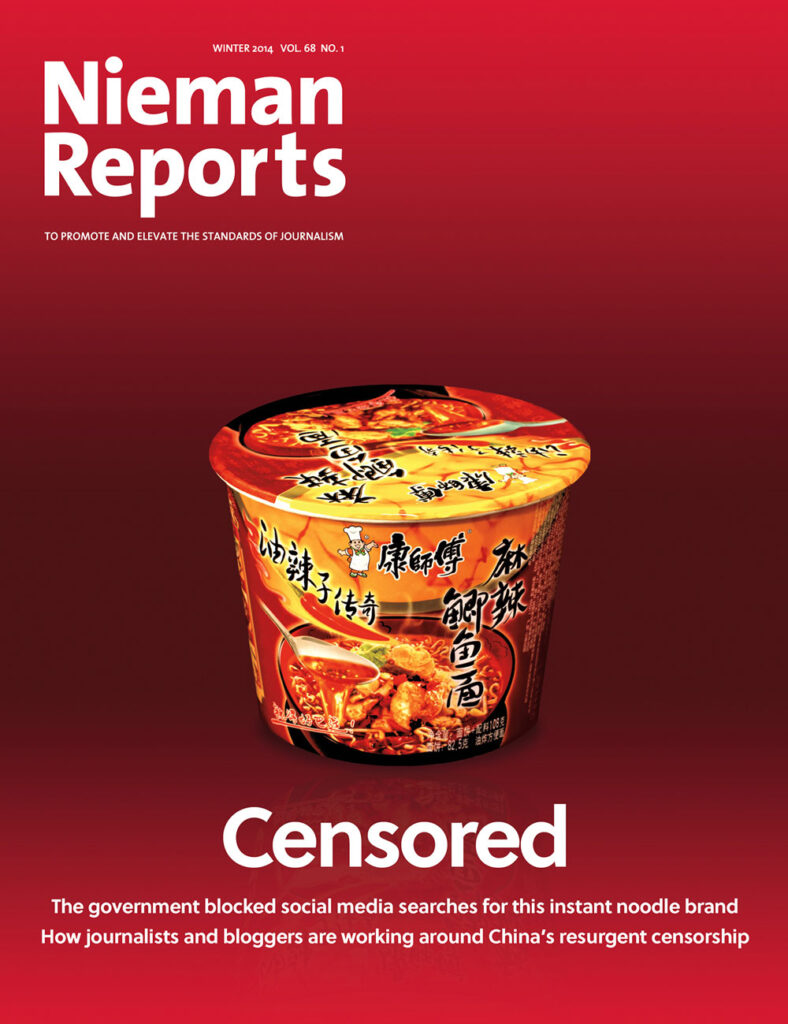In October 2013, journalist Chen Yongzhou of the New Express Daily was detained and arrested after he reported alleged corruption at Zoomlion, a state-owned company. His paper’s front-page pleas for his release drew worldwide attention and sympathy from the public. But on October 26, Chen appeared on national television, admitting that he had taken bribes from anonymous sources to write the stories about corruption. "In this case, I've caused damages to Zoomlion and also the whole of journalism and its ability to earn the public's trust. I did this mainly because I hankered after money and fame. I've been used. I've realized my wrongdoing," Chen told state broadcaster CCTV.
This incident has stirred heated debate, especially about media ethics and “rent-seeking,” the practice of taking bribes to fabricate stories. Not everyone is convinced Chen actually did take bribes; some people believe he was forced by the government to confess. Nevertheless, rent-seeking is alarmingly widespread among Chinese journalists.
Hu Shuli, founder of Caixin magazine and one of China's best-known journalists, wrote a scathing editorial called “News Rent-Seeking Can Never Be Excused,” in which she argued that the credibility of Chinese media is greatly harmed by the corrupt practice. Hu's viewpoint offended some of her fellow journalists, who published commentaries and blogs blaming her for missing the bigger picture of the industry's struggle with increasing censorship and the personal as well as professional pressure under which Chinese journalists work. Some also argued that a confession broadcast on media before a court trial is unfair to a criminal suspect.
A series of events dating back to last August demonstrates the Chinese government’s “divide and conquer” approach to censorship:
With civil movement campaigners such as Wang Gongquan, the government uses an arrest as a warning signal, telling people who want to participate in civil movements to back off. Another example is Ai Weiwei, who was accused of tax evasion, bigamy and dissemination of obscene material.
Even if the CEOs of Internet companies like Weibo have realized the value of social media in building civil society, they still need to be concerned about survival and avoiding a state takeover. With traditional media, the government tries to stigmatize journalists. Detaining them and forcing them to make confessions has a chilling effect on investigative journalists.
The government’s effort to limit the expression of opinions online has proven effective. Zhu Huaxin, the public opinion research director for the People's Daily Online, pointed out in his latest report that the total number of posts in the top 100 active online opinion leaders' microblogs dropped by just under 30% between Sept. 11 and Oct. 10 last year. On Tianya forum, 70% of the reduction occurred in posts about anti-corruption and the defense of rights.
In September, netizens initiated no new anti-corruption campaigns. By contrast, last spring and summer, netizens denounced many officials for corruption, including Liu Zhijun, the railways minister, in connection with a widely reported train accident.
The government’s efforts to discredit dissidents and tighten controls on free speech can be described as "stigma rent-seeking," in contrast to "news rent-seeking." The government may not profit financially from "stigma rent-seeking," but it silences dissidents, protects vested interest groups, and sends political warnings to the rest of Chinese society. What’s at work is a new mechanism to censor the expression of opinions in China. It is increasingly dangerous for netizens who try to use social media to fight for their legal rights.
Zhou Haiyan is associate professor of School of Journalism and Communication, Nanjing University. She is now a visiting scholar at Harvard‘s Yenching Institute
This incident has stirred heated debate, especially about media ethics and “rent-seeking,” the practice of taking bribes to fabricate stories. Not everyone is convinced Chen actually did take bribes; some people believe he was forced by the government to confess. Nevertheless, rent-seeking is alarmingly widespread among Chinese journalists.
Hu Shuli, founder of Caixin magazine and one of China's best-known journalists, wrote a scathing editorial called “News Rent-Seeking Can Never Be Excused,” in which she argued that the credibility of Chinese media is greatly harmed by the corrupt practice. Hu's viewpoint offended some of her fellow journalists, who published commentaries and blogs blaming her for missing the bigger picture of the industry's struggle with increasing censorship and the personal as well as professional pressure under which Chinese journalists work. Some also argued that a confession broadcast on media before a court trial is unfair to a criminal suspect.
A series of events dating back to last August demonstrates the Chinese government’s “divide and conquer” approach to censorship:
- The government has decreed that any post “clicked and viewed more than 5,000 times or reposted more than 500 times” can be considered defamation and may mean jail time for rumor-mongers. Defamation is usually punishable by up to three years in prison.
- Under a “Strike Hard Movement,” hundreds of netizens were penalized for creating and spreading rumors. A student who questioned on his microblog a man’s untimely death was taken into custody.
- Taking aim at opinion leaders online, the government detained businessman and blogger Charles Xue for allegedly hiring prostitutes. Later, on CCTV, he admitted to spreading irresponsible posts online and believing himself to be above the law. Weibo celebrity HuaZong Diu Le Jing Gu Bang's microblog has been quiet since he was detained for alleged extortion.
- Wang Gongquan, a civil society advocate associated with the public interest group Gongmeng, was arrested on suspicion of organizing a mob to disturb the public order.
With civil movement campaigners such as Wang Gongquan, the government uses an arrest as a warning signal, telling people who want to participate in civil movements to back off. Another example is Ai Weiwei, who was accused of tax evasion, bigamy and dissemination of obscene material.
Even if the CEOs of Internet companies like Weibo have realized the value of social media in building civil society, they still need to be concerned about survival and avoiding a state takeover. With traditional media, the government tries to stigmatize journalists. Detaining them and forcing them to make confessions has a chilling effect on investigative journalists.
The government’s effort to limit the expression of opinions online has proven effective. Zhu Huaxin, the public opinion research director for the People's Daily Online, pointed out in his latest report that the total number of posts in the top 100 active online opinion leaders' microblogs dropped by just under 30% between Sept. 11 and Oct. 10 last year. On Tianya forum, 70% of the reduction occurred in posts about anti-corruption and the defense of rights.
In September, netizens initiated no new anti-corruption campaigns. By contrast, last spring and summer, netizens denounced many officials for corruption, including Liu Zhijun, the railways minister, in connection with a widely reported train accident.
The government’s efforts to discredit dissidents and tighten controls on free speech can be described as "stigma rent-seeking," in contrast to "news rent-seeking." The government may not profit financially from "stigma rent-seeking," but it silences dissidents, protects vested interest groups, and sends political warnings to the rest of Chinese society. What’s at work is a new mechanism to censor the expression of opinions in China. It is increasingly dangerous for netizens who try to use social media to fight for their legal rights.
Zhou Haiyan is associate professor of School of Journalism and Communication, Nanjing University. She is now a visiting scholar at Harvard‘s Yenching Institute



